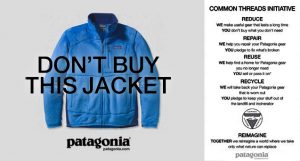It has always been incredibly disconcerting to me that my clothing was likely made by an underpaid and overwork person on the other side of the world. This year, I have learned a lot about the inner workings of the fashion industry and how deeply entrenched our society is in its unjust system. What is even more daunting is how complicated it is going to be to rework the supply chain and logistics to incorporate sustainability ethics.
It gives me hope that other people around the world are now starting to realize how unacceptable the fashion industry is. One of the companies who is taking incredibly impressive action to combat the disparity in the global fashion industry is Patagonia.

Patagonia is one step ahead of the game as they have been innovating their environment focused sustainable business practices for over 30 years.
Their unique business model has built a brand counterintuitive to traditional business as they put making the “right choice” first and profit second. Strong faith to this core value is translated in many ways, such as encouraging employees to go outdoors, however, the most prevalent value for the general population is the high quality of their clothing. With the primary intention of building clothes that will be durable and perform well in the face of adventure, Patagonia is using their clothing to translate their core values.
Building the clothes from sustainable materials is Patagonia’s biggest point of differentiation. This, in addition to their massive charitable donations and outdoor spirit, has caused Patagonia to succeed in making their stores “not just a place to buy something, but a place where the community can gather and feel like it’s their shop.” In other words, Patagonia has created a culture, not just a brand. Creating a culture that is demonstrated through a brand is difficult, and rare, but doing so enables Patagonia to focus minimally on marketing their clothing and mostly on the company’s initiatives. An example of this is their “Don’t Buy This Jacket” campaign. A campaign that most marketers would consider suicide, but for Patagonia was a huge success as it translated their core values and publicized their common threads initiative.

Furthermore, Patagonia has succeeded in achieving a large price premium, making margins higher than their competitors. The successes of Patagonia truly exemplifies the triple bottom line and shows that making the right choice can also lead to business success.
Kimberly Wong
April 7, 2017 — 5:29 pm
I think we can all agree that after this course, Patagonia has gained a whole bunch of new fans! As an Operations & Logistics student, I’ve studied cases on child labour in manufacturing, and I’m curious to know if Patagonia has any ways to monitor their manufacturing plants to ensure that their standards are being held. (Ideally, this wouldn’t be necessary, but Patagonia is still in the industry of consumer goods. I guess second to ideal would be that a trusted third-party auditor would be able to check in on-site to make sure that health and safety standards were abided by.)
IsabellaBruckmuller
April 8, 2017 — 8:50 am
Great post Katie! I also struggle a lot with aligning my values with a fashion company, when it comes to purchase decision making. From my point of view, companies like Patagonia can chance the play and show other companies in the industry incorporating sustainability can lead to success. Another company example, which pushes for more transparency and reporting in the fashion industry is PUMA.
Nevertheless do you believe that huge fashion brands like H&M or Zara will incorporate sustainable values in future. And if where do you think should they start?
daweiw
April 10, 2017 — 3:11 pm
Love Patagonia. They’re dope, they make great products, and definitely have company values that all brands should look up to. However, I don’t think this means people should start going out and buying Patagonia. The key to reducing your carbon footprint, particularly when it comes to fashion, is (as Patagonia has advertised) to not buy anything at all!
What Patagonia has done is made being sustainable cool. When I see someone wearing the brand, it almost acts as an indicator that they are in fact sustainable. It is, however, important to realize that the clothes that are in your closet right now, though they may not be “branded” as being sustainable, are far more sustainable to continue to wear them than to go out and buy a new jacket.
JoshMcLean
April 10, 2017 — 5:57 pm
Oh, what do you know? Even after this class is over I still need to hear about friggin’ Patagonia!
Just kidding, nice post, Katie.
As we have mentioned all semester, Patagonia has really got it down to an art as far as incorporating their core values into their business and their products — in one of the most difficult industries to do so. I wonder if other companies will move towards this model. I truly hope so.
On this topic, a good documentary to watch is called “Minimalism”. You can find it on Netflix, and it’s a nice introduction to the “radical” idea of only buying what we truly need in life. I have tried to start incorporating the principles in my life: I brought my boots to the cobbler for the first time. They have served me well for three years, and I’m hoping to get another three years out of them!